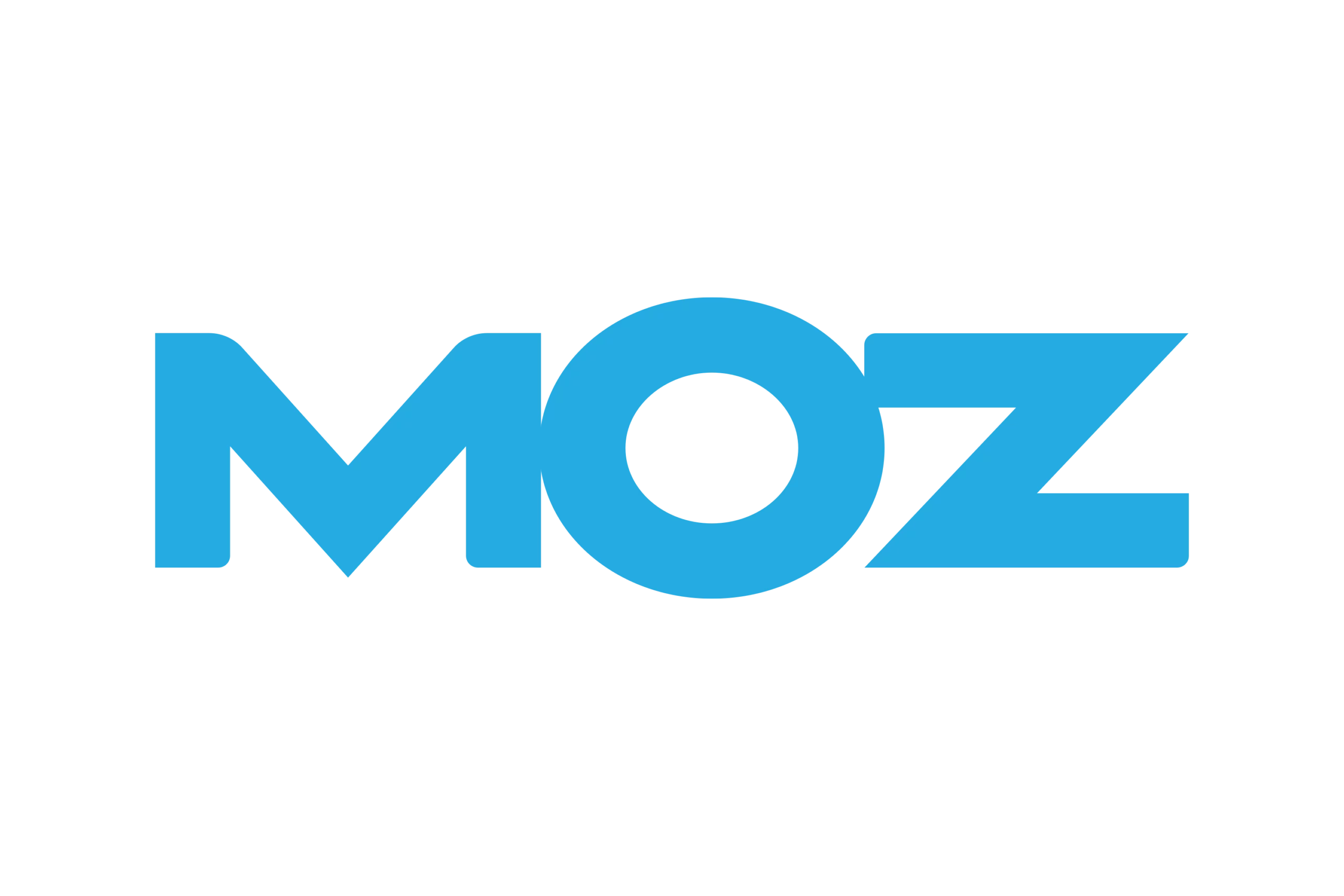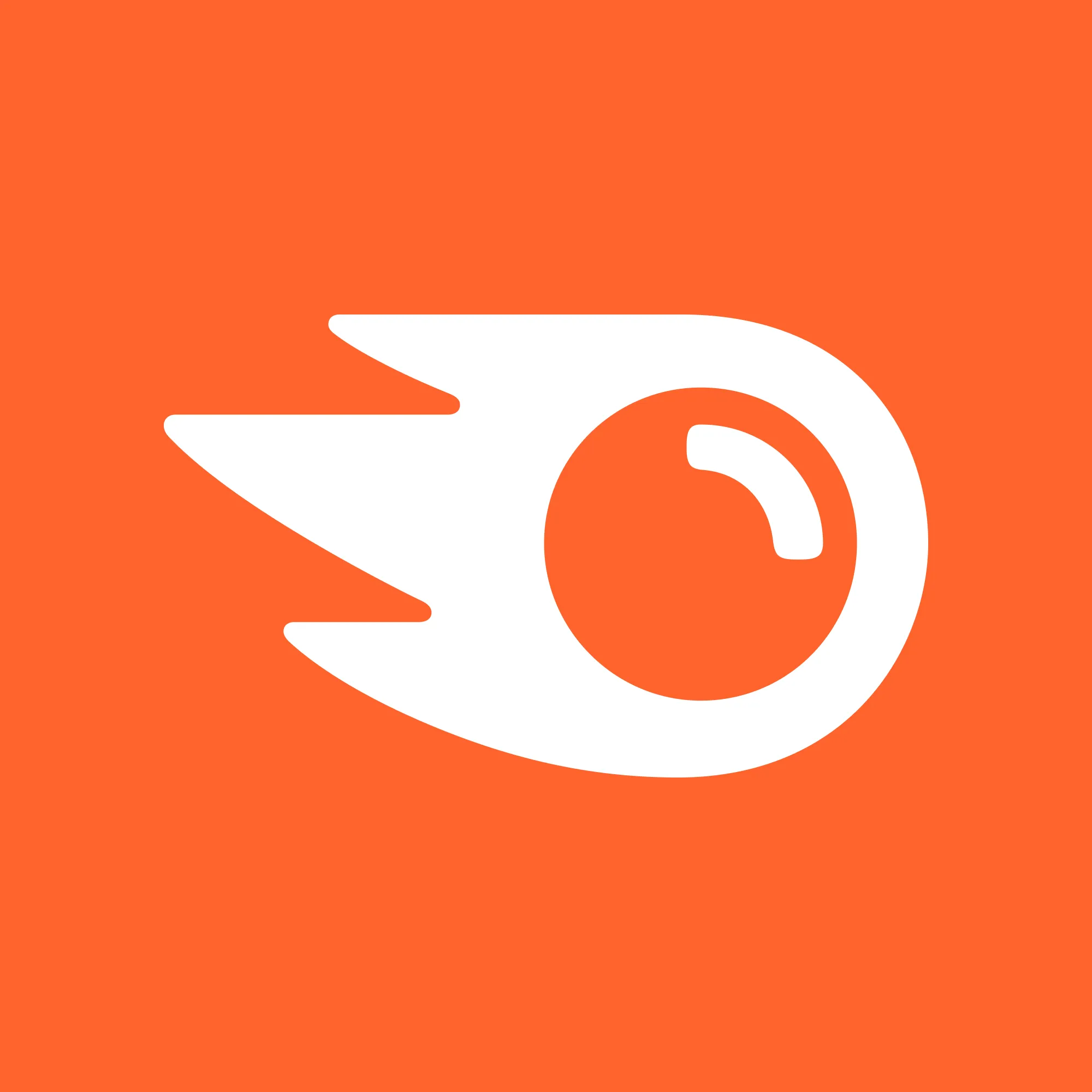Best For | Beginners and small businesses seeking easy-to-use tools for keyword research, site optimization, and domain authority insights. | Marketing professionals and agencies who need an all-in-one platform for SEO, PPC, social media, and competitor research. |
Price | Starts from $39/month (Billed Annually) | Starts from $117.33/month (Billed Annually) |
Features | Simple keyword research | Advanced keyword analysis |
Pros | Beginner-friendly interface | Comprehensive marketing toolkit |
Cons | Smaller backlink database | Expensive subscription tiers |
Introduction: Moz Vs Semrush
Choosing the right SEO tool can make or break your digital marketing success. If you’re trying to decide between Moz and Semrush, you’re in the right place!
Moz is best for beginners and small businesses looking for simple SEO tools and affordable pricing.
Semrush is the go-to choice for marketing professionals and agencies who need advanced keyword tracking, PPC insights, and competitor research.
In this detailed Moz vs Semrush 2026 comparison, I’ll break down their features, pricing, and pros & cons—so you can choose the best tool for your needs.
By the end of this article, you’ll have a clear picture of each tool and which one to choose.
Moz Vs Semrush 2026: Overview
What Is Moz?
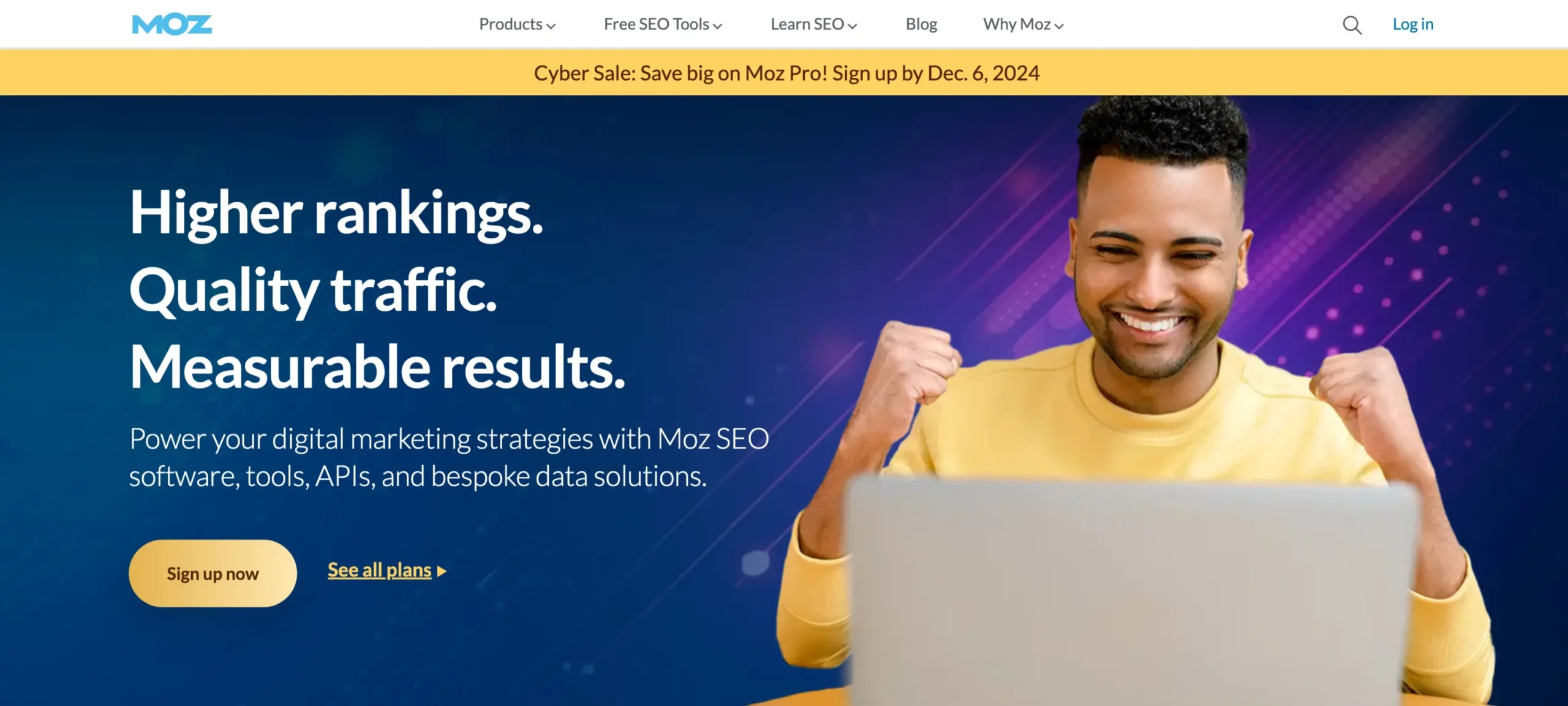
Moz was founded in 2004 and started as an SEO blog and online community. Over time, it evolved into a comprehensive SEO software platform.
Moz focuses on the core aspects of SEO and aims to make it simple for everyone to use. Its tools are built for businesses of all sizes, but especially for small to mid-sized businesses and beginners.
The platform includes tools for:
- Keyword research: Finding the best keywords to rank for.
- Rank tracking: Monitoring your rankings in search engines.
- Backlink analysis: Checking the quality of links pointing to your website.
- Site audits: Finding and fixing technical issues on your website.
Moz is also famous for its metrics, such as Domain Authority (DA) and Page Authority (PA), which are widely used to measure the strength of websites and pages.
These metrics are simple to understand and help businesses evaluate their performance at a glance. Moz’s user-friendly approach makes it a favourite among marketers who want results without dealing with too much complexity.
What Is Semrush?
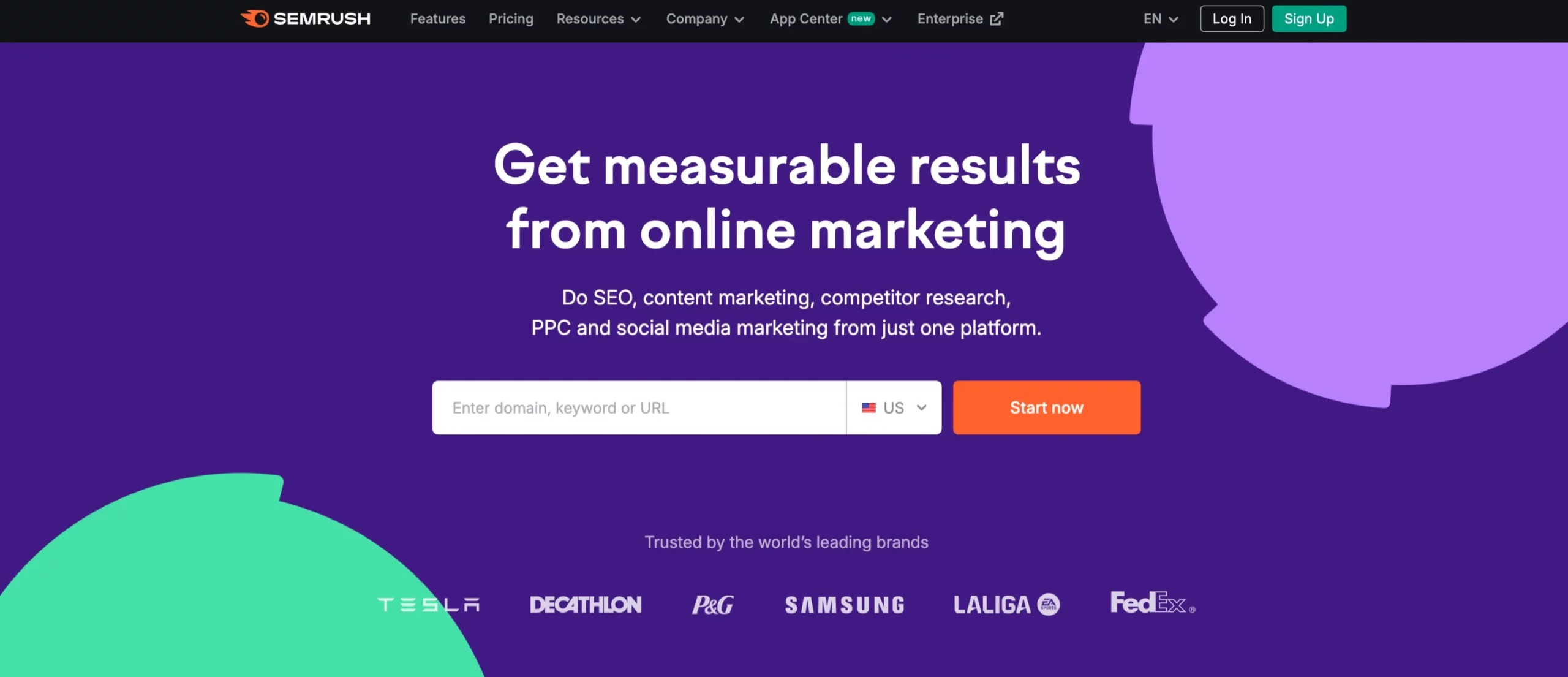
Semrush was launched in 2008 as an SEO tool but has since evolved into a comprehensive digital marketing suite.
Unlike Moz, which focuses on SEO, Semrush goes beyond it by including tools for:
- PPC (Pay-Per-Click) advertising
- Content marketing
- Social media management
- Competitive analysis
Semrush is known for its huge database, which includes over 25 billion keywords and 43 trillion backlinks.
It provides detailed data and analytics, making it ideal for agencies and large businesses. Semrush offers powerful features, but its complexity can be a challenge for beginners.
It’s designed for marketers and professionals who need in-depth insights to make advanced strategies.
Moz Vs Semrush: Comparing Their Features
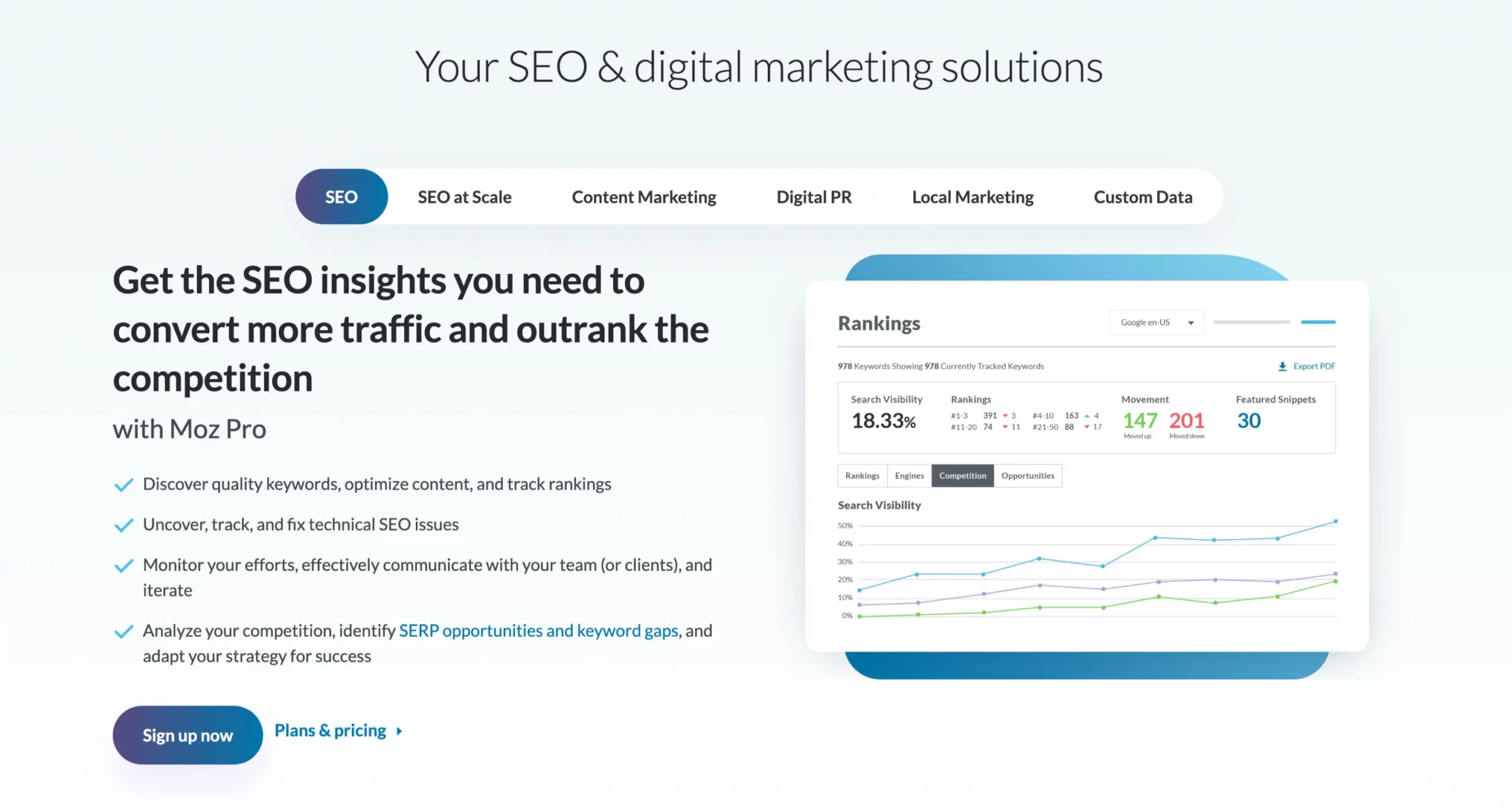
Let’s examine Moz and Semrush’s features more closely. Each tool has strengths, and understanding them will help you choose the right one for your needs.
1. Keyword Research: Which Tool Finds the Best Keywords?
Keyword research is one of the most important parts of SEO. Both Moz and Semrush offer tools to help you find valuable keywords, but they do this in different ways.
To compare keyword research accuracy, I tested Moz and Semrush using the keyword “Best SEO Tools.”
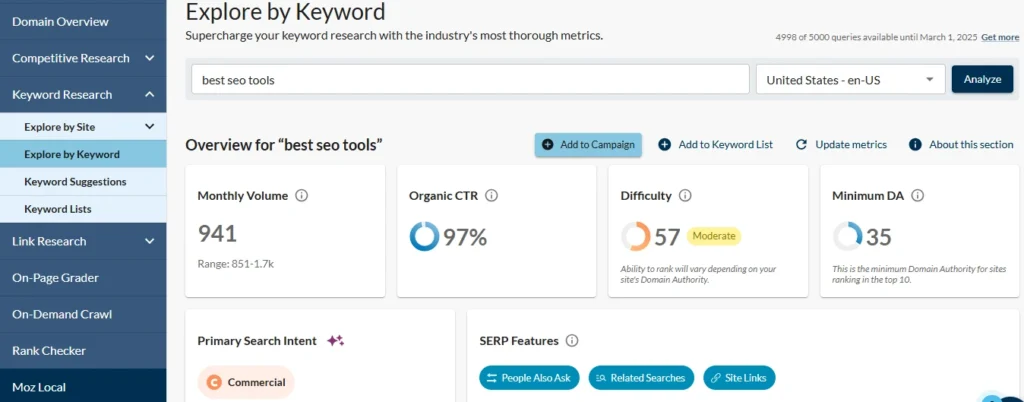
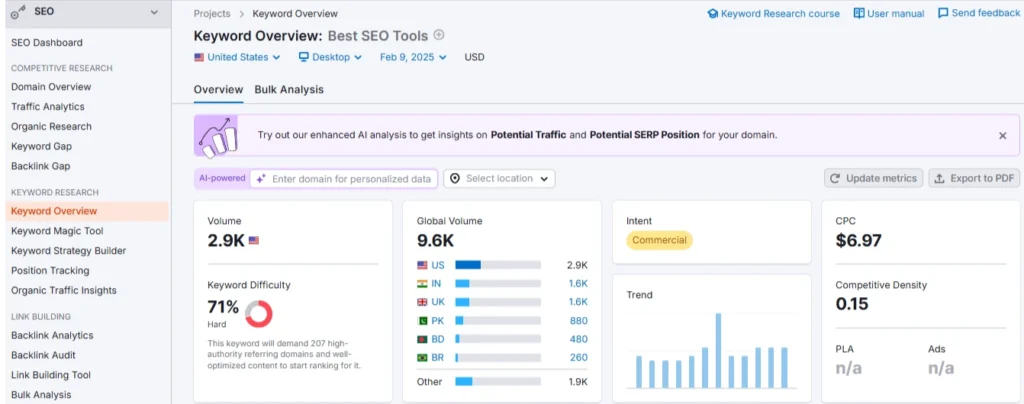
| Feature | Moz | Semrush |
|---|---|---|
| Search Volume (US) | 941 | 2,900 ✅ |
| Global Search Volume | ❌ Not Available | 9,600 ✅ |
| Keyword Difficulty (KD) | 57 (DA-based) | 71 (Backlink-based) ✅ |
| CPC (Cost-Per-Click) | ❌ No Data | $6.97 ✅ |
| Click-Through Rate (CTR) | 97% ✅ | ❌ No Data |
| Competitive Density | ❌ Not Available | 0.15 ✅ |
| SERP Analysis (Top Ranking Sites) | Basic | Full backlink & ranking history ✅ |
| Long-Tail Keyword Suggestions | 320 | 1,250 ✅ |
Key Findings:
1. Semrush provided 3x more keyword variations and better CPC & competition data, making it ideal for SEO & PPC strategies.
2. Moz’s Click-Through Rate (CTR) metric is useful for assessing organic traffic potential, but lacks deep competitor insights.
3. Semrush offers SERP analysis, showing which domains rank, their backlink strength, and historical ranking trends—which Moz lacks.
Winner: Semrush
📌 Why?
- Larger keyword database (25B+ keywords vs. Moz’s 500M)
- More accurate difficulty score (Moz bases KD on DA, while Semrush factors in backlinks & SERP strength)
2. Site Audits: Fixing Technical Issues
A site audit checks your website for technical issues that might hurt your rankings. Both Moz and Semrush have tools for this.
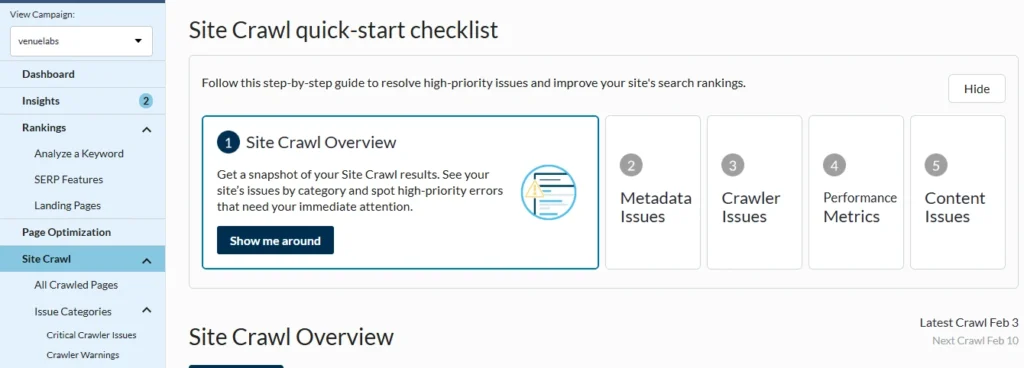
Moz’s Site Crawl tool focuses on identifying and fixing critical SEO issues. It highlights problems like:
- Broken links
- Duplicate content
- Crawl errors
- Missing or poorly optimized metadata
The tool organizes the issues by priority, making it clear which ones to address first. This saves time and ensures that you fix the most important problems first.
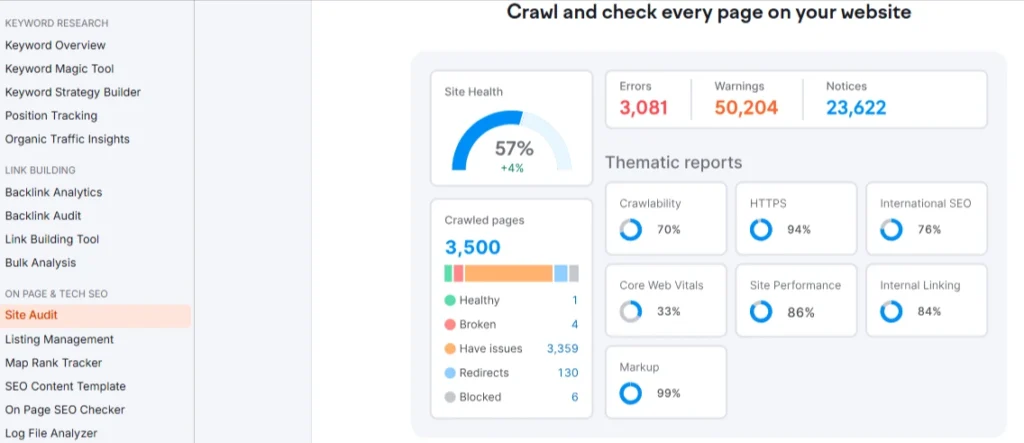
Semrush’s Site Audit tool is more comprehensive and covers over 130 types of issues. It checks for:
- HTTPS implementation
- Core Web Vitals (site speed and user experience)(critical for user experience and rankings, as explained in Google’s Core Web Vitals documentation)
- Site Performance
- Markup
While Semrush provides more details, the reports can be overwhelming for smaller businesses without dedicated SEO teams.
Winner: Moz.
Moz’s focus on simplicity and prioritization makes it better for small to medium-sized businesses.
3. Backlink Analysis: Evaluating Your Links
Backlinks remain one of Google’s top ranking factors.
I tested Moz vs Semrush by analyzing Forbes.com’s backlink profile.
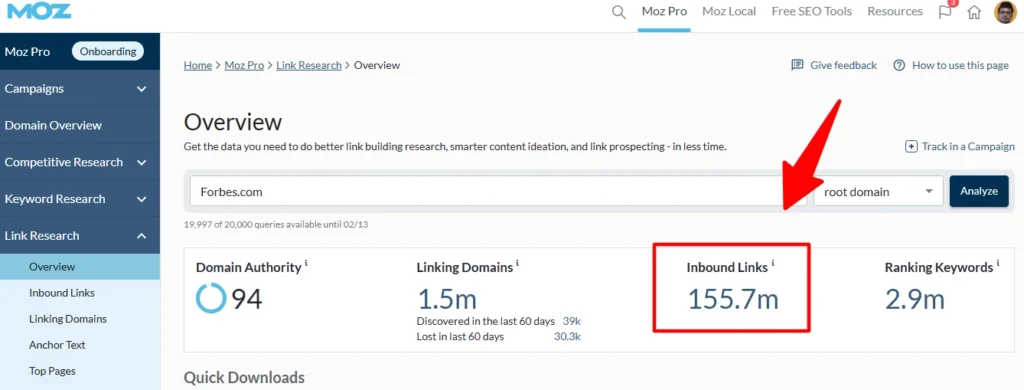
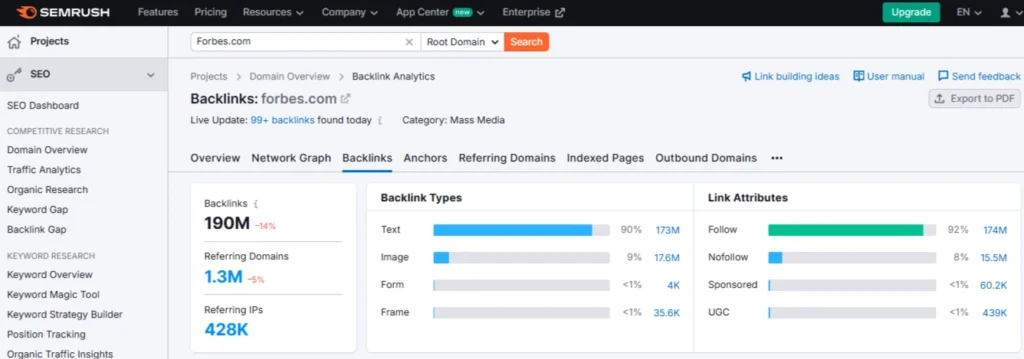
| Feature | Moz | Semrush |
|---|---|---|
| Total Backlinks Found | 155.7M | 190M ✅ |
| Referring Domains | 1.5M ✅ | 1.3M |
| Referring IPs | ❌ No Data | 428K ✅ |
| Spam/Toxicity Score | ✅ Spam Score | ✅ Toxicity Score |
| Update Frequency | Monthly | Daily ✅ |
| Competitor Backlink Gap Analysis | ❌ No | ✅ Yes |
Key Findings:
1. Semrush detected 22% more backlinks and updated link data daily, while Moz updated monthly.
2. Moz’s Spam Score is great for identifying low-quality links, but Semrush’s Toxicity Score is more advanced, grading link quality based on multiple SEO signals.
3. Semrush’s Link Intersect tool reveals which sites link to competitors but not to you, a crucial feature missing in Moz.
Winner: Semrush
📌 Why?
- More backlinks detected (190M vs 155.7M)
- More frequent updates (daily vs. monthly in Moz)
- Better competitor backlink tracking (Link Intersect tool)
4. Rank Tracking: Monitoring Your Performance
Rank tracking is essential for measuring your SEO success. Both tools let you track keyword rankings over time.
Moz’s Rank Tracker allows you to monitor local and national rankings. It provides simple reports showing how your rankings have improved over time.
It’s ideal for businesses that want to see clear trends without too much complexity.
Semrush’s Position Tracking tool offers more frequent updates (daily) and includes competitor tracking.
You can see how your rankings compare to those of your competitors, which can help you adjust your strategy.
Winner: Semrush.
Semrush’s detailed tracking and competitor analysis make it the better choice for advanced users.
5. Ease of Use: Simplicity vs. Complexity
Moz is well-known for its clean and user-friendly design. Its interface is straightforward, and even beginners can navigate it without much trouble.
This makes it ideal for small businesses or individuals who are new to SEO.
Semrush, on the other hand, has a more complex interface due to its extensive features. Although it offers more options, the sheer number of choices can feel overwhelming for users unfamiliar with SEO tools.
Winner: Moz.
Moz’s simplicity and ease of use make it more accessible.
6. Pricing: Which Tool Is More Affordable?
While Semrush is more expensive, it offers a wider range of features beyond SEO (e.g., PPC & content tools).
| Plan | Moz Pro | Semrush |
|---|---|---|
| Starter Plan | $31/month ✅ | $117.30/month ❌ |
| Features Included | Keyword research, DA tracking, Site Audit (basic) | SEO, PPC, content tools, backlink analysis, competitor research ✅ |
| Best For | Small businesses, beginners ✅ | Agencies, enterprises, advanced SEOs ✅ |
| ROI for Agencies? | ❌ Limited features | Better all-in-one toolkit ✅ |
Key Findings:
- Moz is more affordable ($31/month vs. Semrush’s $117.30/month), making it better for budget-conscious users.
- Semrush includes PPC, social media, and competitor tracking tools, providing better long-term value for agencies & large businesses.
- Moz’s cheaper plans come with feature limitations—many advanced SEO tools (like backlink gap analysis) are missing.
Winner: Moz for affordability, Semrush for feature depth
📌 Why?
- Moz is cheaper for small businesses ($31/month vs. $117.30/month).
- Semrush offers better value for agencies by combining SEO, PPC, and content marketing tools.
Moz Vs Semrush: Pricing Options
Moz Pricing Options
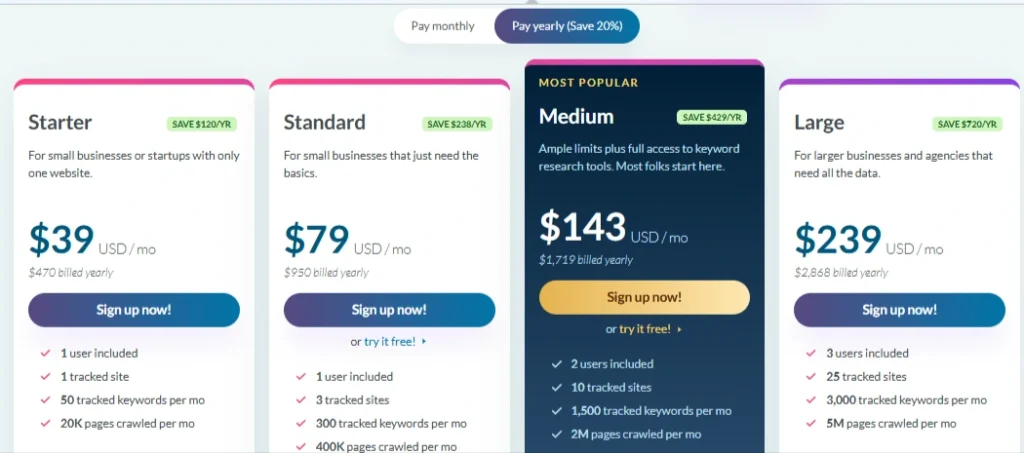
1. Starter Plan
Price: $49/month (or $39/month if billed annually)
Perfect for: Small businesses or startups with a single website.
Includes:
- 1 user
- 1 tracked site
- 50 tracked keywords per month
- 20,000 pages crawled per month
- Basic SEO tools like keyword research and site tracking
2. Standard Plan
Price: $99/month (or $79/month if billed annually)
Perfect for: Small businesses that need the basics to grow.
Includes:
- 1 user
- 3 tracked sites
- 300 tracked keywords per month
- 400,000 pages crawled per month
- Additional tools like backlink analysis and unlimited reports
3. Medium Plan
Price: $179/month (or $143/month if billed annually)
Perfect for: Businesses that want full access to keyword tools.
Includes:
- 2 users
- 10 tracked sites
- 1,500 tracked keywords per month
- 2 million pages crawled per month
- Branded reports and more advanced SEO features
4. Large Plan
All the features from the Medium plan, with even more data.
Price: $299/month (or $239/month if billed annually)
Perfect for: Larger businesses or agencies with multiple sites.
Includes:
- 3 users
- 25 tracked sites
- 3,000 tracked keywords per month
- 5 million pages crawled per month
Semrush Price Plans
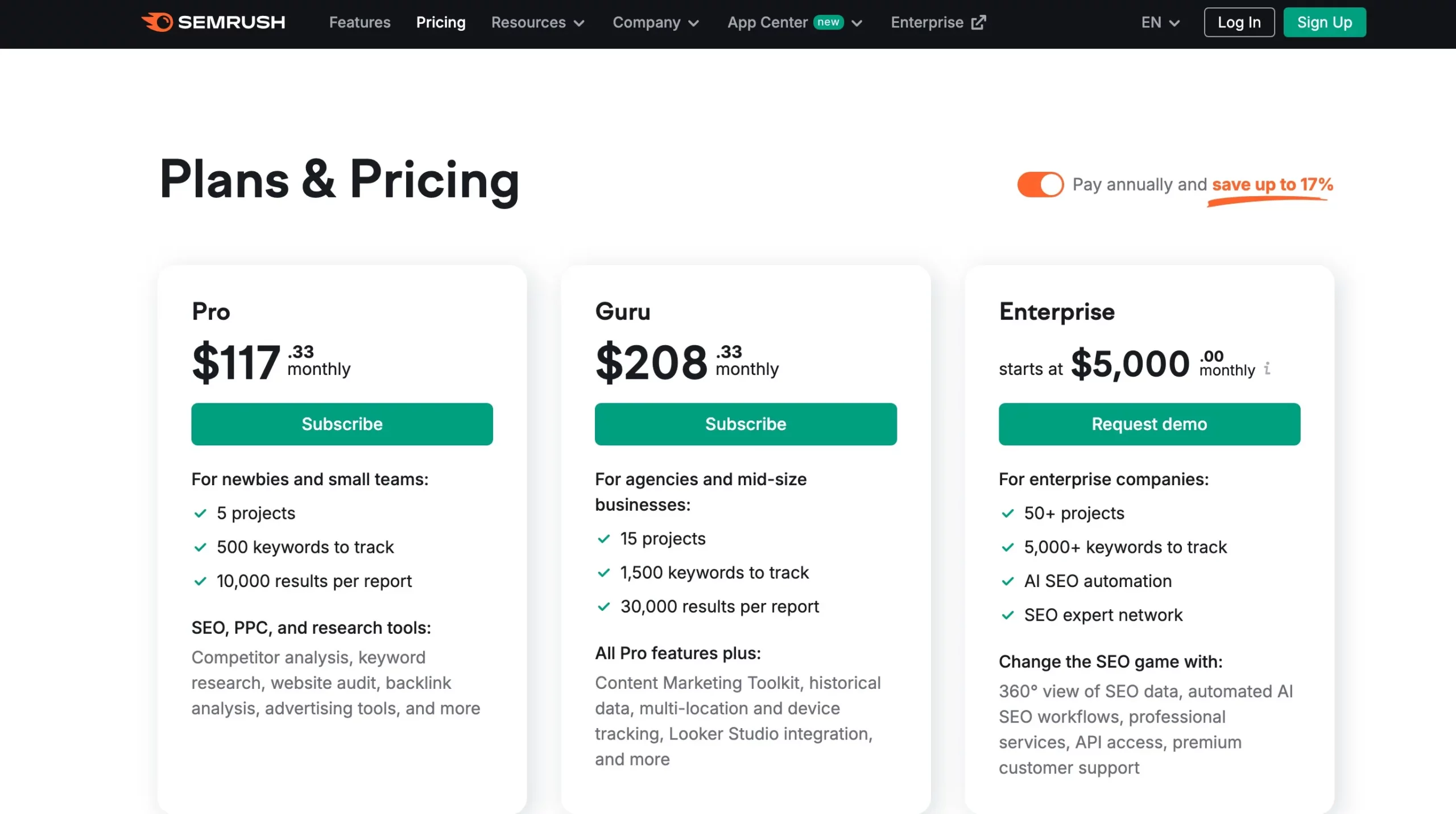
1. Pro Plan – $117.33/month (billed annually)
Perfect for small teams:
- 5 projects and 500 keywords
- Essential SEO and PPC tools: keyword research, site audit, competitor analysis, and more
2. Guru Plan – $208.33/month (billed annually)
Best for growing businesses:
- 15 projects and 1,500 keywords
- Includes Pro features plus: content marketing tools, historical data, and multi-location tracking
3. Enterprise Plan – Starting at $5,000/month
For large-scale companies:
- 50+ projects and 5,000+ keywords
- AI-powered SEO, API access, expert support, and custom solutions
Other Factors To Consider
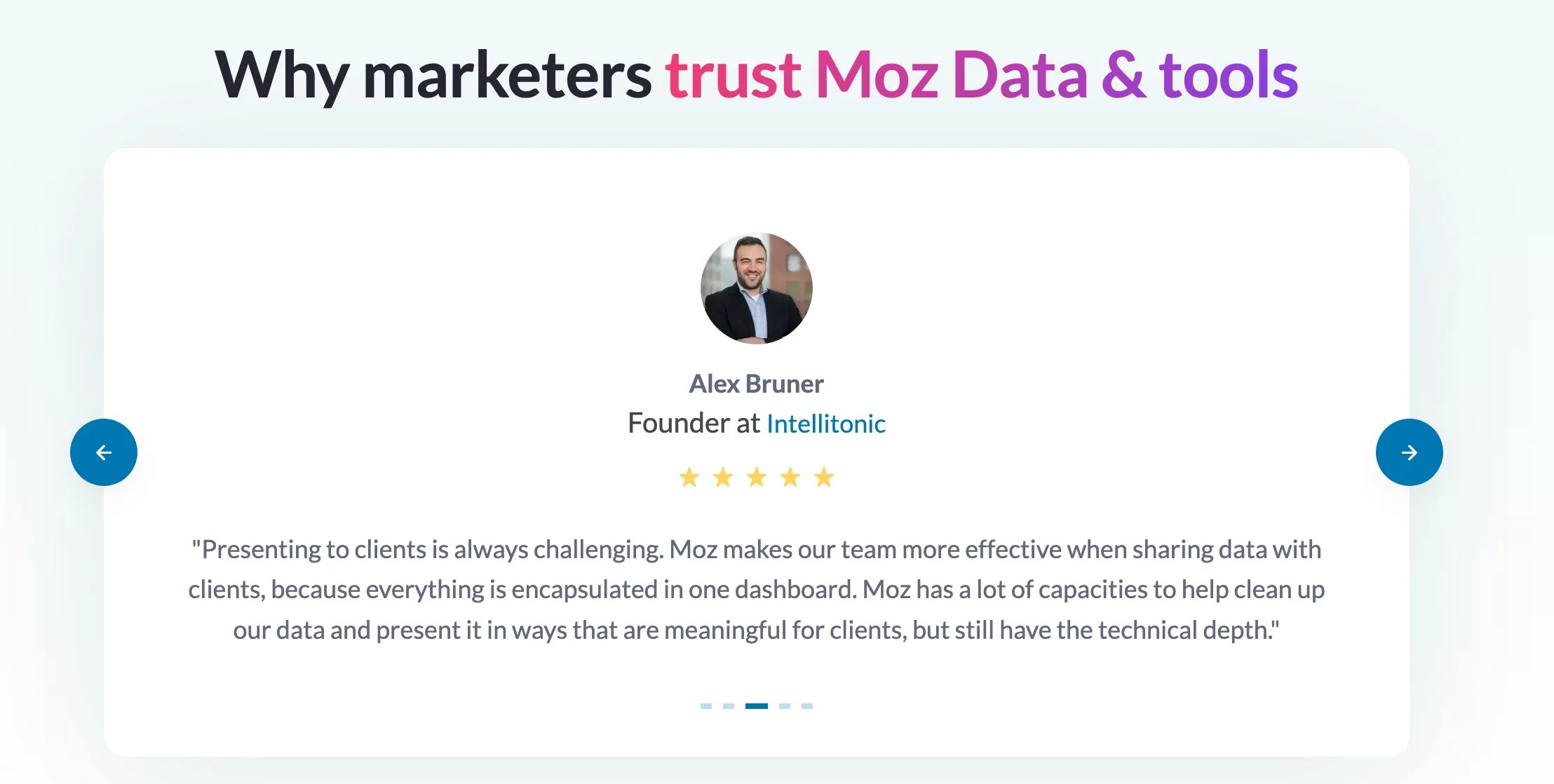
1. Support and Resources
Moz has a strong online community and provides plenty of resources, such as blogs, webinars, and tutorials. These resources are beginner-friendly and help users understand SEO concepts.
Semrush also offers extensive training materials, including certifications. However, these resources are more advanced and better suited for experienced users.
Winner: Moz.
Moz’s resources are more accessible for beginners.
2. Specialization
Moz focuses solely on SEO. This specialization ensures that all its tools are designed to improve search rankings.
Semrush, on the other hand, is an all-in-one platform that combines SEO with PPC, social media, and content marketing tools. While this is great for agencies, it may feel unnecessary for businesses that only need SEO tools.
Winner: Moz.
Moz’s specialization in SEO makes it a better choice for businesses focused on search rankings.
Moz vs Semrush: How to Use Both for Better Results
Moz and Semrush are both powerful SEO tools, but did you know you can use them together for even better results? Instead of choosing just one, combining their strengths can help you get deeper insights, improve rankings, and drive more traffic.
Here’s how to make the most of both:
1. Use Semrush for Keyword & Competitor Research
Semrush has a large keyword database and provides detailed competitor insights. Start by using Semrush to:
- Find high-performing keywords with traffic potential
- Analyze competitors’ top-ranking pages and backlink profiles
- Track keyword positions to see what’s working and what needs improvement
2. Use Moz for Domain Authority & Local SEO
Moz is great for tracking domain authority (DA) and improving local search rankings. Here’s how to use it:
- Monitor your Domain Authority (DA) to see how strong your website is
- Use Moz Local to manage business listings and improve local search rankings
- Run site audits to fix technical SEO issues
3. Run a Site Audit on Both Tools for a Full Picture
Both tools offer SEO audits, but they analyze different aspects. Running an audit on both Moz and Semrush gives you a more complete view of what’s holding your site back. Semrush goes deep into technical SEO issues, while Moz simplifies site health tracking.
4. Use Semrush for Content & Backlink Strategy
Semrush has a content marketing toolkit that helps you:
- Optimize content with the SEO Writing Assistant
- Track backlinks and find new link-building opportunities
- Identify which pages need content updates for better rankings
5. Use Moz to Track Long-Term SEO Progress
Moz’s Domain Authority (DA) and Page Authority (PA) metrics help you measure your SEO growth over time. Use them to:
- See if your site is gaining authority in your industry
- Track how your SEO efforts are improving your rankings
- Make data-driven decisions based on long-term trends
By combining their strengths, you’ll have a well-rounded SEO strategy that covers all aspects of ranking higher on Google.
Semrush vs Moz: What Users Are Saying 🏆
When choosing between Semrush and Moz, real user experiences can provide valuable insights into which tool is the best fit.
Here’s what professionals in the industry have to say about both platforms.
What Users Love About Semrush

All-in-One SEO & Marketing Tool
“What I appreciate most about Semrush is that it covers all areas of search with its tools, so I can have a 360-degree view of my projects.”
— Esther Giménez, Senior SEO & UX Consultant, Annalect, Omnicom Media Group

Powerful for Agencies & Businesses
“If you ask an agency to deliver 10x organic search growth through content, they will assign a large team to your project. Our content team, in contrast, runs activities with Semrush without having an army of people specialized in SEO.”
— Fabrizio Ballarini, SEO Lead, TransferWise

Great for Keyword Tracking & Research
“We chose Semrush because the keyword tracking was much more accurate than our previous tools and the interface was very intuitive.”
— Freddy Hunt, Director of SEO and Content Marketing, Oneupweb

Significant Organic Traffic Growth
“There is a direct correlation between using Semrush, being focused on SEO, and the sheer growth that we’ve had. Our organic traffic was up by 230% in 2019. Literally every day we are getting the highest traffic ever on our website.”
— Eric Bogard, VP of Marketing, Arkadium
What Users Love About Moz
Reliable & Long-Term SEO Support
“Moz’s all-in-one toolkit has been the backbone of our services for a long time. We set it up on day one, and we continue to rely on its insight to have stability in our service as we help our clients grow their brands and succeed in search.”
— Tony Edward, SEO Director, Tinuiti

Great for Measuring Traffic & Conversions
“With Moz and DashThis, we are able to measure the traffic and conversions our clients care about. Now, our clients are always asking, ‘Can we do more SEO?'”
— Jeroen Bos, Co-Owner, LeadLogic
Smooth Website Migrations Without Traffic Loss
“When switching domains, we prepared for a 7–10% loss in traffic. 90 days after launch, we had +29% organic traffic. It would have been much harder to navigate this transition without Moz Pro.”
— John Varghese, Director of SEO, TopSpot
Moz Vs Semrush: Pros and Cons
Moz
Pros
- Easy-to-use interface suitable for beginners
- Reliable keyword research and SEO tools
- Strong educational resources and community support
- Offers transparent SEO metrics like Domain Authority (DA)
- Affordable entry-level plans for smaller teams
Cons
- Smaller backlink database compared to competitors
- Higher pricing for smaller businesses
Semrush
Pros
- Comprehensive suite for SEO, PPC, and content marketing
- Extensive backlink and keyword databases
- Real-time rank tracking and frequent updates
- Advanced competitor analysis and insights
- Powerful content optimization tools with AI-driven recommendations
Cons
- Steeper learning curve for beginners
- Premium pricing tiers may not suit small businesses
- Some tools can feel overwhelming for basic SEO tasks
Quick Links:
- SimilarWeb Vs SEMrush
- Ahrefs Vs Moz
- Moz Vs Ubersuggest
- Sitechecker Pro Vs Semrush
- 12+ Best SEMrush Alternatives
Moz vs. Semrush 2026: Which One Should You Choose?
Both Moz and Semrush are excellent SEO tools, but they serve different types of users.
| Choose Moz If You… | Choose Semrush If You… |
|---|---|
| ✅ Are a beginner or small business looking for an easy-to-use SEO tool. | ✅ Need an all-in-one marketing platform for SEO, PPC, content, and social media. |
| ✅ Want affordable pricing with a 30-day free trial. | ✅ Require detailed competitor research & PPC insights. |
| ✅ Prefer simpler keyword & backlink tools over data-heavy dashboards. | ✅ Work in SEO agencies or manage large-scale projects. |
| ✅ Rely on Moz’s Domain Authority (DA) metric for link-building strategies. | ✅ Need the largest keyword database (25+ billion keywords). |
💡 Final Thought:
- For SEO beginners & small businesses → Moz is a better choice because it’s affordable, easy to use, and focused on SEO fundamentals.
- For advanced users & marketing professionals → Semrush is superior due to its extensive keyword database, competitor research, and PPC capabilities.
- If budget allows, using both tools together can provide the best of both worlds.

